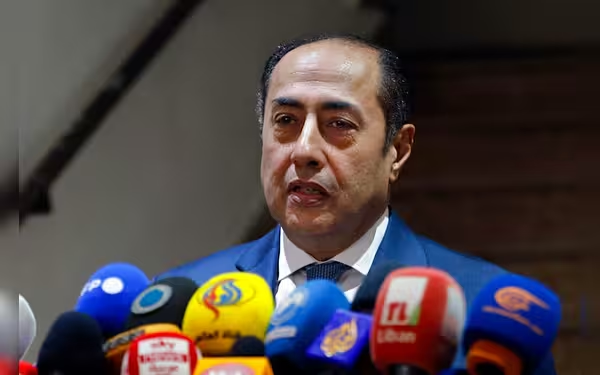Saturday, November 16, 2024 05:35 PM
Arab League Urges End to Gaza Conflict and Palestinian Statehood
- Arab League calls for ceasefire in Gaza conflict.
- UN criticized for inaction on Palestinian statehood.
- Over 41,000 casualties reported in Gaza since October.
 Image Credits: arabnewspk
Image Credits: arabnewspkThe Arab League calls for an end to the Gaza war and the establishment of a Palestinian state amid rising casualties and international concern.
The ongoing conflict in Gaza has drawn international attention and concern, particularly from the Arab League, which has recently called for an end to the war and the establishment of a Palestinian state. This situation has escalated dramatically, with significant loss of life and destruction of infrastructure, prompting urgent discussions at global forums.
During the Summit of the Future held in New York on September 22 and 23, Assistant Secretary-General Hossam Zaki of the Arab League emphasized the need for the United Nations to take a more active role in resolving conflicts in the Middle East. He described the current global situation as a dangerous "crossroads," where the stability of the world hangs in the balance. Zaki's remarks came in the wake of Israel's airstrikes in southern Lebanon and Beirut, which resulted in the deaths of at least 500 individuals and injuries to over 2,000, according to the Lebanese Ministry of Health.
Since the onset of hostilities following Hamas' attacks on October 7 of the previous year, the situation in Gaza has deteriorated significantly. Reports indicate that Israeli forces have killed more than 41,000 people in the Gaza Strip, with a majority being women and children. The destruction of homes and civilian infrastructure has left many in dire conditions. Zaki pointed out that the lack of a resolution to the ongoing violence diminishes the world's capacity to address the conflict effectively.
He criticized the UN for its perceived inaction, stating, "For a whole year, we in the Arab region had felt this unfortunate paralysis, as months had passed by before the UN Security Council was able to pass a resolution last June calling for a ceasefire and the end of the Israeli aggression on Gaza." This delay has led to frustration among many member states, as they feel the UN has not adequately responded to the crisis.
Zaki also highlighted what he termed the international community's double standards regarding Israel's actions. He noted the "disgraceful silence" surrounding the situation in Gaza, contrasting it with the substantial support provided to nations in conflict elsewhere. This inconsistency raises questions about the fairness and effectiveness of international responses to humanitarian crises.
Moreover, Zaki expressed disappointment over the UN's failure to recognize Palestine as a full member state, despite the fact that 149 member states acknowledge Palestine. He argued that this recognition reflects a broader consensus that the UN should consider in its deliberations. He stated, "The current UN structure stands against the international consensus of establishing an independent Palestinian state."
The call from the Arab League for an end to the Gaza war and the establishment of a Palestinian state underscores the urgent need for a unified international response to the ongoing crisis. As the world watches, it is crucial for global leaders to prioritize humanitarian efforts and work towards a peaceful resolution that respects the rights and dignity of all individuals involved. The path to peace may be fraught with challenges, but it is a journey that must be undertaken for the sake of future generations.













